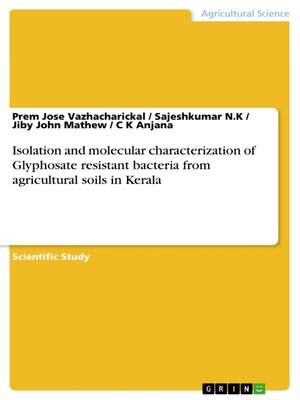Isolation and molecular characterization of Glyphosate resistant bacteria from agricultural soils in Kerala
ebook
By Prem Jose Vazhacharickal

Sign up to save your library
With an OverDrive account, you can save your favorite libraries for at-a-glance information about availability. Find out more about OverDrive accounts.
Find this title in Libby, the library reading app by OverDrive.



Search for a digital library with this title
Title found at these libraries:
| Loading... |
Scientific Study from the year 2016 in the subject Agrarian Studies, grade: 1.5, Mar Augusthinose College, language: English, abstract: Glyphosate (N-phosphonomethylglycine) is a herbicide that is used worldwidely. Its common trade name is Roundup. Its non-targeted species action makes it most popular herbicide. It was developed by Monsanto company. The primary target for glyphosate is the enzyme EPSPS (5-enolpyruvoylshikimate 3-phosphate synthase). When glyphosate binds to EPSPS it forms a very stable complex that essentially permanently disables the enzyme and hence affect the metabolic activity of the plant and results in its death. Finding Glyphosate degrading microorganisms from soil is an interesting topic since glyphosate is non- targeted in its toxicity. Microorganisms were isolated from soil samples, which were then identified by molecular method. Isolation of DNA, its amplification using 16s rRNA gene and its sequencing are the major steps involved. Bioinformatics tool helps to identify the microorganisms. Two microorganisms identified are Pseudomonas sp. and Achromobacter sp. In the phylogenetic analysis also the two organisms are grouped as separate clads. In these, strain 1 showed highest growth in the Glyphosate containing medium than strain 2. These results show that the bacterial strain may possess potential to be used in bioremediation of glyphosate-contaminated environments.






